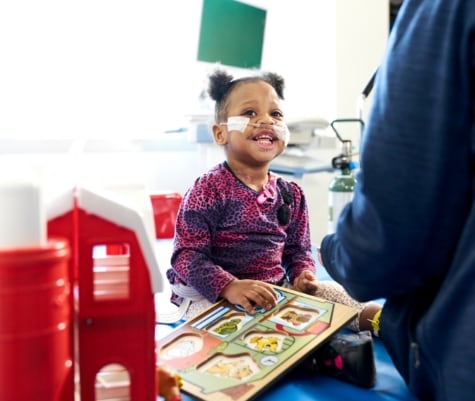
Inpatient Rehabilitation
Pediatric inpatient rehabilitation helps children and young adults up to 21 years old, who are recovering from conditions, injuries or illnesses that have caused loss of function in daily living activities, mobility, cognition or communication.
Inpatient rehabilitation means your child will be staying at a healthcare facility while they receive daily physical, psychological, social and cognitive treatment (around six hours a day), so that they can become as independent as possible.
There are many factors to consider when deciding where to send your child for inpatient rehab services. Here are some questions to ask the facility before you choose rehabilitation for your child:
- Is the facility accredited by the Commission on Accreditation of Rehabilitation Facilities (CARF)?
- Is the facility a full-service hospital with emergency services?
- Does the facility provide access to care from pediatric and multispecialty physicians?
- Does the rehab team include board-certified pediatric physiatrists?
- How many patients are assigned to each nurse or therapist?
- What is the therapy treatment schedule for weekdays and weekends?
- Are there support groups for families, caregivers and siblings?
- Does the facility emphasize the role of the family in treatment?
- Are family members allowed to stay overnight in the room with the patient?
- Does the rehab program have 24-hour respiratory therapists to care for the patient?
Why Choose Children’s for Pediatric Inpatient Rehabilitation?
When your child or teen has a life-changing injury or illness, you want them to have the best care. The Pediatric Inpatient Rehabilitation Program at Children’s Healthcare of Atlanta is one of the nation’s largest pediatric programs of its kind.
Our 28-bed Pediatric Inpatient Rehabilitation Program at Scottish Rite Hospital offers 24-hour nursing care and a wide range of therapies and services seven days a week. Because our inpatient rehabilitation facilities are located within a completely comprehensive pediatric hospital, your child will have access to not only pediatric rehabilitation specialists, but also specialized care or emergency services they may need.
Individualized Pediatric Care
We use everyday activities and individualized therapy plans to motivate children and teens, from birth to 21 years of age, to help achieve the best possible outcomes.
Our pediatric rehabilitation specialists understand the unique needs of children and teens, and customize their therapy and care to meet their physical, emotional and psychological needs. Our goal is to help patients return to their home, community and school as quickly as possible with the highest level of function in self-care, motor skills, cognition, communication, life activities, and social and emotional adjustment.
CARF Accredited Inpatient Rehab Program
Our pediatric Inpatient Rehab Program is accredited by the Commission on Accreditation of Rehabilitation Facilities (CARF), which has awarded Children’s specialty recognition for our Spinal Cord Specialty Program, Brain Injury Specialty Program, Cancer Rehab Specialty Program and Pediatric Specialty Program.
Comprehensive Pediatric Rehabilitation Services
We provide easy access to pediatric specialists across many disciplines, as well as education, peer support, outings, family support and social events in a welcoming environment. Read more about our therapies and services.

Helping Kids and Teens Reach Their Goals
Patients from all over the country visit Children’s to have our rehabilitation specialists help them reach their highest potential.
Dedicated Care Teams, Individualized Treatments
Each patient has a dedicated care team that will collaborate with you and your child to establish treatment goals, address individual needs and make ongoing adjustments during rehabilitation. Expect your care team to check in daily, participate in family conferences and provide ongoing education and support.
We will assess your child’s physical abilities, activity limitations, participation restrictions and environmental factors to help create a treatment plan that is unique to your child.
Inpatient Rehab Staffing Ratios
At Children's Inpatient Rehabilitation Program, we make sure patients receive the time and support they need from their care team. To accomplish this, we keep the staff-to-patient ratios low, so our nurses and therapists can spend their time with your child.
- Each therapist typically cares for six patients a day.
- Each nurse typically cares for four patients a day.
- Each nurse treating ventilator patients typically cares for three patients a day.
We believe the relationship with your child’s nursing team is important. Your child will be assigned two primary nurses, one for daytime and one for the night. They will help coordinate your child’s care throughout their stay in pediatric inpatient rehabilitation. We have two nursing stations and 24-hour nursing care.
Our nurses will:
- Establish a therapeutic relationship with you and your child.
- Help identify your child’s unique health needs and create plans to care for them.
- Communicate and coordinate care across team members.
- Teach you how to care for your child’s unique needs.
- Show you the skills you will need to care for your child at home.
Your child will be treated by a multidisciplinary team of inpatient rehab specialists that may include:
- Audiologists
- Board-certified pediatric and subspecialty doctors
- Chaplains
- Palliative care specialists
- Pharmacists
- Psychologists
- Physical therapists
- Music therapists
- Neuropsychologists
- Nutritionists
- Occupational therapists
- Orthotics and prosthetics
- Physiatrists
- Recreational therapists
- Registered rehabilitation nurses
- Rehabilitation case managers
- Respiratory therapists (available 24 hours a day)
- Social workers
- Speech therapists
- Child life specialists
- Certified teachers
- Chaplains
- Volunteers
Our team reviews several areas to make sure that patients will be a good fit for our pediatric Inpatient Rehabilitation Program. Some of our considerations include whether the patient is:
- Medically stable while requiring 24-hour nursing care and availability of physician care.
- In need of coordinated physical, occupational and/or speech therapies due to conditions or injuries that have caused physical and/or functional issues.
- Able to participate in a minimum of three hours of therapies each day.
- A Level II or above on the standardized Rancho Los Amigo Level of Cognitive Functioning Scale (a scale that checks brain recovery after an injury).
- Not in a coma or persistent vegetative state. Patients must show response to their surroundings.
We also consider conditions that may impact a child or teen’s ability to participate in therapy, such as needing ongoing psychiatric services, having behavioral issues, or if they may pose a risk or impact other patients. If a child does not meet the admission criteria, we provide caregivers with other resources and options.
Referrals
Referrals for admission are accepted from physicians, hospitals and other post-acute providers from local, regional, national or international areas.
Family Support and Education
We provide family-centered support and help you build connections. Our team knows that the involvement of family and caregivers is key to a child or teen’s successful rehabilitation and getting them back home safely. We will:
- Assess your family’s ability to support and participate in the care plan.
- Provide education and training opportunities to support the patient and family throughout the child’s rehab stay.
- Promote a healthy lifestyle and help build coping and adaptation skills.
Caregiver Education
Throughout your stay you will receive education and training that covers your child's diagnosis and how to take care of them. It is scheduled individually by your child’s team. Talk to your nurse about the schedule for CPR training.
Family Support Groups
- Weekly caregiver support groups: Weekly support group meetings are facilitated by our chaplain and other members of our team.
- Peer Mentoring: Our chaplain helps coordinate visits from past patient families who can provide perspective and companionship on your journey.
- One-on-one sibling support: Our child life specialists can help your other children learn about and adjust to any special needs that your family may have.
Celebrate and Connect
Graduates of our Inpatient Rehabilitation and Day Rehabilitation Programs and their families are invited each year to attend our Rehab Reunion. Celebrate your child’s hard work and see friends who were a part of your child’s rehabilitation journey.
Caring for Teens
While teenagers may start to look like adults, our team understands that following an injury, surgery or condition that requires an inpatient stay, they have unique physical and emotional needs that our pediatric specialists can address in our nurturing environment. We know how to motivate and support teenagers through their recovery process. We offer a gym specifically designated for teenagers featuring age-appropriate environments and equipment for their age and size.
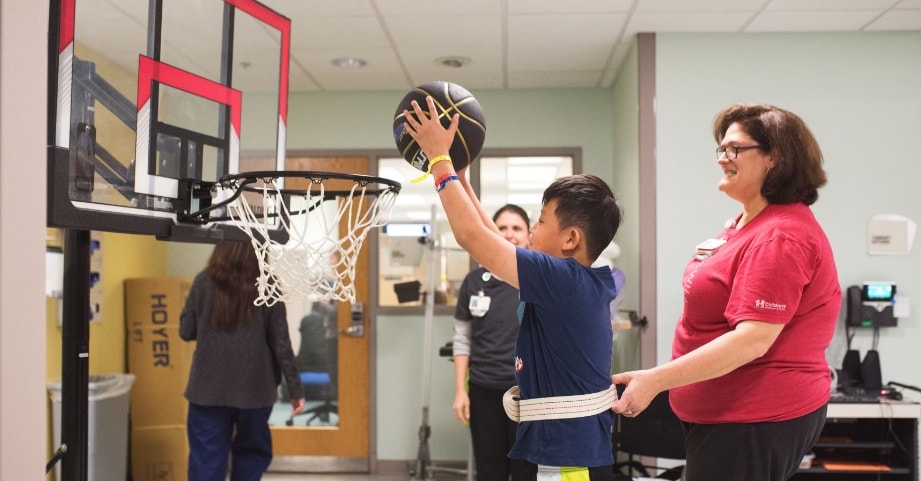
At Children’s, we offer comprehensive inpatient rehabilitation for kids, teens and young adults recovering from a variety of conditions, including:
Our Brain Injury Rehabilitation Program has specialty recognition from the Commission on Accreditation of Rehabilitation Facilities (CARF) and focuses on the complex needs of kids and teens who have experienced a brain injury as result from trauma (injury), disease or other neurological conditions. We also care for patients who have a brain injury in addition to another condition such as a spinal cord injury, fractures and other conditions (also called a dual diagnosis).
Our team includes Certified Brain Injury Specialists who are experienced and trained to treat patients with brain injuries.
Disorders of Consciousness
We provide specialized, intensive rehabilitation to children who are medically stable and demonstrating a disorder of consciousness following a brain injury. Children receive medical care and therapy to increase responsiveness and function, and families receive extensive training to care for the child at home.
Our Cancer Rehabilitation Program has specialty recognition from the Commission on Accreditation of Rehabilitation Facilities (CARF) and uses a multidisciplinary team approach to address the unique rehabilitation needs of children, teens and young adults who have been diagnosed with all types of cancer. Our team collaborates with oncologists and other pediatric specialists to deliver coordinated care to optimize outcomes.
Our pediatric Spinal Cord Injury Rehabilitation Program has specialty recognition from the Commission on Accreditation of Rehabilitation Facilities (CARF) and provides specialized rehabilitation for children and young adults with spinal cord injuries caused by trauma (injury) or disease. Our program treats all levels and causes of spinal cord injuries, including patients who have tracheostomy (breathing tube) and ventilator (machine that breaths for the patient) dependence. We treat a variety of spinal cord injuries, including:
- Cervical (C1 – C8)
- Thoracic (T1 – T12)
- Lumbar (L1 – L5)
- Sacral (S1 – S5)
Our team cares for patients with many additional conditions including:
- Amputations
- Burns
- Cardiac conditions
- Developmental disabilities
- Neurological conditions and disorders like seizures, encephalopathy and anoxia
- Orthopedic injuries or conditions after surgery
- Respiratory dysfunctions
- Strokes
- Selective dorsal rhizotomy
- Trauma
We are happy to speak with you about your child’s individual needs and how we can support their recovery.
Thriving After a Spine Injury
-
Dancing After Rehab
Thanks to Children’s Healthcare of Atlanta pediatric neurosurgeons, our specialized therapists, and her own determined spirit, Arielle is back to doing what she loves.
At Children’s we are proud of the quality care we provide for children and teens in need of inpatient rehabilitation.
On average, we typically have about 22 patients in our program at a time.
Most patients stay with us for about 23 days.
Outcomes data is from 2024. Our outcomes were compiled from Uniform Data System for Medical Rehabilitation and patient satisfaction surveys.
- Patient Satisfaction: 90%
- Average Number of Days in Rehab Program: 28.75 Days
- Discharged Home: 100%
- Number of Patients Admitted: 31
- 0 to 3 Years Old: 2
- 3 to 5 Years Old: 1
- 5 to 7 Years Old: 3
- 7 to 10 Years Old: 4
- Older than 10: 21
- Patient Satisfaction: 88.1%
- Average Number of Days in Rehab Program: 28.4 Days
- Discharged Home: 96.6%
- Number of Patients Admitted: 182
- 0 to 3 Years Old: 44
- 3 to 5 Years Old: 17
- 5 to 7 Years Old: 16
- 7 to 10 Years Old: 20
- Older than 10: 85
- Patient Satisfaction: 90%
- Average Number of Days in Rehab Program: 20.7 Days
- Discharged Home: 81%
- Number of Patients Admitted: 32
- 0 to 3 Years Old: 6
- 3 to 5 Years Old: 8
- 5 to 7 Years Old: 5
- 7 to 10 Years Old: 3
- Older than 10: 10
- Patient Satisfaction: 90.4%
- Average Number of Days in Rehab Program: 26.6 Days
- Discharged Home: 97.2%
- Number of Patients Admitted: 322
- 0 to 3 Years Old: 86
- 3 to 5 Years Old: 30
- 5 to 7 Years Old: 20
- 7 to 10 Years Old: 36
- Older than 10: 152

During your child’s inpatient rehab stay, the level of care and help your child needs to complete different tasks may change as they move through their plan. The team will teach you how to provide safe care for your child at each level.
Patients are expected to participate in three hours of physical, occupational and/or speech therapy, five days a week, or they may have 15 hours of therapy over a seven-day period.
What is the daily treatment schedule?
Our inpatient rehabilitation team will create a program to meet your child’s needs. Some of their rehabilitation activities may be the same as those of other patients in the program, but some activities may differ. Therapy and activities are provided a minimum of three hours per day, seven days a week. This increases as your child improves.
See a sample schedule below:
- 7 to 8:30 a.m.: activities of daily living, medication and tube feedings (if needed)
- 8 to 8:30 a.m.: breakfast
- 8:30 a.m. to noon: individual or group therapy sessions
- Noon to 1 p.m.: lunch group or break time in your child’s room
- 1 to 4 p.m.: individual or group therapy sessions
- 4 to 5 p.m.: group time or break time in your child’s room
- 5 to 6 p.m.: dinner in your child’s room
- 6 to 8 p.m.: family time, evening programs (posted in Hospital Happenings)
- 10 p.m.: TV off and lights out
Your child will be offered a bath daily.
What will my child’s room be like?
All 28 of our inpatient rooms are private and can sleep up to two adults in addition to the patient.
All rooms include:
- A private bathroom
- A TV
- A safe for valuables
- Overhead lift equipment to help with bed mobility
- Linens, including sheets, pillows and blankets
- A sofa that converts to a bed for parents or caregivers
Our facility also includes:
- Treatment rooms and gyms designed for our patients’ unique needs
- An activity room and a learning lab
- A family lounge area with a microwave, vending machine, refrigerator and freezer for parents and caregivers
- Washer and dryer availability (including laundry detergent)
- Meeting rooms
Therapy sessions on weekdays are usually two half-hour sessions or a single one-hour session per therapy type. Therapy sessions on weekends and holidays are 30-to-45-minute sessions per therapy type. Therapy sessions can be in an individual or group format. The rehabilitation team establishes the patient’s daily treatment schedule. Consideration of medical procedures (e.g., chemotherapy, radiation, dialysis) or other extenuating circumstances (e.g., naps, family visits) are reflected in the patient’s schedule.
Team members will create an individualized treatment plan for your child or teen that incorporates a variety of equipment and therapy techniques to address their condition. As they progress through therapy and regain strength and function, we’ll introduce new equipment and exercises to help them continue to improve.
In addition to addressing specific therapy goals, therapy sessions may also include:
- Activities of daily living, such as washing, dressing and brushing teeth
- Transfers into and out of bed
- Transport to and from room when needed
- Diaper changing or bathroom training
- Caregiver training
Your child also may take part in activities, such as:
- Cooking
- Pet therapy
- Community outings
- Craft and peer groups
- Chapel services
- Music therapy
- Activities in The Zone or front lobby
- Teen activities and events

Specially Designed for Kids and Teens
Our three gyms, including a quiet gym and a teens gym, were designed to meet the unique needs of our patients. In addition to our gyms on the rehab floor, we also have a Center for Advanced Technology and Robotic Rehabilitation
Every child’s condition and needs are unique, so their therapies will depend on the treatment plan that the care team creates. We offer a variety of therapies including:
We provide aquatic therapy using the unique properties of water to improve movement and function.
Our inpatient rehab facility has a state-of-the art hydrotherapy pool with a variable-depth floor, underwater treadmill, parallel bars, resistant jet capability, video cameras, and a myriad of flotation and aquatic therapy equipment.
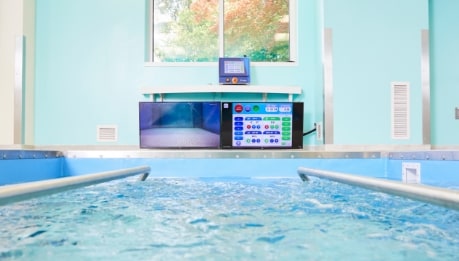
Patients may participate in group therapy and peer support groups with other patients who are facing similar challenges and goals. These groups allow patients to talk about their injuries or illnesses and support each other during their stays. In addition, we connect our patients and families with former patients of similar age and diagnosis. This gives our families mentors to help them throughout their rehabilitation journeys.
Occupational therapy teaches your child how to manage activities of daily living including self-care, bathing, grooming, dressing and cooking. Our pediatric inpatient rehab occupational therapists work with your child to do things such as eating, drinking and going to the bathroom. This includes working on physical, cognitive and vision problems that may have come from your child or teen’s injury or illness.
Physical therapy is an important part of our pediatric Inpatient Rehabilitation Program. Our pediatric physical therapists help your child improve their muscle tone, balance, strength, endurance and movement through exercise and activity. We also focus on mobility, walking or wheelchair skills, coordination and balance. These skills help your child become more mobile.
Our Center for Advanced Technology and Robotic Rehabilitation offers a wide range of advanced technologies as part of the overall treatment strategy for children and teens with motor skills impairment.
Robotic Therapies:
- Help children perform more repetitions and practice skills they may not be able to perform otherwise.
- Allow our therapists to use computers and sensor controls to direct and pace a child’s movement.
- Promote communication between the brain and muscles.
- Promote motor learning by tracking a child’s response and providing biofeedback.
Our pediatric speech therapists provide individualized care to address a variety of speech, language, thinking, and feeding or swallowing problems in children and teens.
Our speech-language pathology services combine assessment procedures and age-appropriate therapies to discover and treat the cause of your child or teen’s problem.
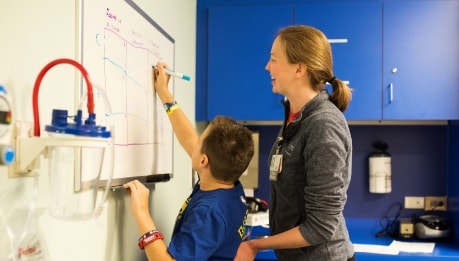
Children’s therapeutic recreation not only will help your child resume the activities they enjoyed before hospitalization, it will also introduce them to new activities. Playing in this way can be a profoundly healing experience.
This service includes augmentative communication options, advanced computer access, and seating and mobility. Assistive technology can provide children and teens the opportunity to enjoy a variety of activities and gain independence using devices such as adaptive video game controllers, sports equipment, toys, fishing poles and more.
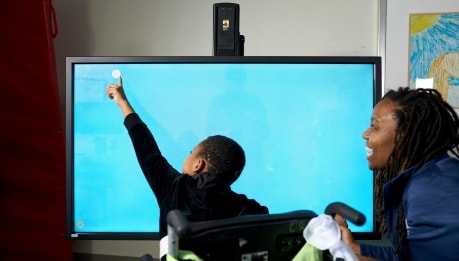

In addition to therapy, your child or teen will have access to many hospital services to help them during their rehabilitation journey.
Our child life specialists provide quality care for your child and family throughout your child’s hospital stay. This may include educating your child about illness, treatment and surgery, as well as preparing any siblings for hospital visits. The specialists provide support during procedures and help normalize a child’s environment through age-appropriate play and group activities.
Children’s Canines For Kids is an animal-assisted therapy program that helps ease anxiety and promotes shorter recovery times. Canine Assistants trains our facility dogs to provide therapy, hope and healing by giving loving support and company to our patients. The facility dogs in our rehabilitation program are trained to assist in the therapeutic experience by helping patients move and communicate while providing emotional support.
We offer behavioral health services provided by licensed pediatric psychologists with specialized experience in treating patients with rehabilitation needs. The services provided by our psychologists include family education and training, individual one-on-one counseling for your child, and behavioral health support provided alongside our rehabilitation therapists. The goal of these services is to address the behavioral health needs of your child, provide holistic care, and support all aspects of your child’s recovery. Families are also provided with outpatient behavioral health referrals for treatment following discharge.
Our program also offers dedicated teachers to collaborate with patients, families and individual school systems to develop educational plans and facilitate a smooth transition back to school. Our dedicated team of certified teachers helps patients and families navigate the process of school reentry by communicating with your child’s school during their stay, as well as facilitating the process of returning to school and advocating for any needs your child may have.
The certified teacher is also available to you and your child’s school after discharge. The certified teacher can:
- Work with you, your child and the school to help ensure a safe and successful return to school.
- Teach you what you need to know about your child’s return to school.
- Work with the school faculty and staff, so that they are better prepared to meet your child’s needs.
- Give the school information about your child’s illness (with your permission).
- Teach the school staff about how to work with your child.
- Be involved in school meetings and designing your child’s Individual Education Plan (IEP).
Our team offers a variety of other services based on the specific needs of each patient. Some of our other services include:
- Music therapy
- Neuropsychology
- Nutrition
- Respiratory therapy
- Spiritual care
- Social work
- Case management
- Pharmacy

When can my child go home?
Our team may decide your child is ready to go home if they have met their goals, if they are no longer medically stable enough to participate in rehabilitation, are not improving toward their goals, or may need a different level of care or another service provider. The average time patients spend in our program is about 23 days.
With input from you, your child and your child’s care team, we will create a discharge plan and include your child’s ongoing care plan with coordination from your case manager. Our case managers work closely with your family and the rehabilitation team to help determine the next steps for care.
How does Children’s prepare families for care at home?
We promote healthy lifestyles, coping and adaptation skills that support active lifestyles to help patients return home, to the community, and to school as quickly as possible. If needed, therapists may provide an on-site home assessment to recommend modifications or special equipment that may help your child live safely at home.
Our specialists want to make sure you feel confident in caring for your child when you leave our program. Our specialists will teach you what you need to know and do for at-home care, including:
- Medicine administration: What medicines are prescribed and how to get them, store them, measure them and dispense them.
- Nutritional management: What foods are recommended and how to feed your child in the healthiest way possible.
- Bowel and bladder care: How to keep your child dry, including how to change diapers and provide toilet retraining.
- Respiratory care: How to manage the devices that keep your child breathing, such as ventilators and tracheotomies.
- Safety management and care: How to keep your child healthy, infection-free and safe at home.
- Community education and reintegration: How to include your child in family life, such as taking trips, going to appointments and attending community events.
- Transfer and mobility: How to move, position and travel with your child, as well as how to operate and manage a wheelchair.
- Skin care: How to care for your child’s skin and prevent problems.
- School reentry and advocacy: How to help your child adjust and function at school and what you should know about government requirements for educational support.
- Diagnosis and recovery: What you need to know about your child’s diagnosis and what you can expect during recovery.
You and your child may benefit from an outing in the community with staff before going home. The outing is a time for you and your child to practice the skills learned during the rehab stay and identify any areas that need special attention before going home. Therapists and nurses will be present on the outing to help with any questions you have about how to have outings when you’re back at home.
If your child’s doctor thinks they are medically ready and could benefit from an outing, they will work with your team to schedule a date.
What to Expect on the Outing
A therapeutic outing is part of your child’s treatment plan. The rehabilitation team will set goals for you and your child to work on during the outing.
Some examples of outing locations include a trip to the mall, a park or the zoo. These outings typically occur either Thursday or Saturday during the day. The location of your child’s outing is determined by the needs and goals of all the children and caregivers who are scheduled to attend that outing.
- A caregiver is required to go on the outing, unless previously discussed with your team.
- Transportation for your child and one caregiver will be provided. If you would like more than one caregiver to participate in the outing, please discuss options with the team before the outing.
- The team will discuss meal options before your child’s outing.
After the outing, the team will ask for your feedback on what you would like to practice more.
As part of your training, you may be asked to ‘room-in’ (stay) with your child for at least 24 hours to practice the skills you have learned. This practice will help you experience what it may be like when you are caring for your child at home. “Room-in” training may be done in your child’s room or in our transitional living room. You and your child’s treatment team will decide which place is best for your child.
We will give you a list of what your child needs and teach you what you need to know in advance.
Care After Inpatient Rehab
Patients who complete their care in our Inpatient Rehabilitation Program may also benefit from some of the other services Children’s offers.
Day Rehabilitation Program
The Day Rehabilitation Program is a full-day therapy program for patients recovering from traumatic brain or spinal cord injuries, cancer, neurological diseases, debility or other conditions. It’s designed to help children and teens regain skills to perform everyday activities. Structured like a regular school day, the Day Rehabilitation Program is available from 9 a.m. to 3 p.m. on weekdays.
The rehabilitation team—which includes physical therapists, occupational therapists, speech-language pathologists, recreational therapist, psychologists, neuropsychologist, nurses and teachers—places a special focus on physical therapy, occupational therapy, speech-language pathology, school reentry and community reintegration.
Driver Rehabilitation Program
Our Driver Rehabilitation Program assesses a teen’s ability to safely learn to drive or return to driving after an injury or illness that affects cognitive function, vision or physical abilities. It includes clinical and behind-the-wheel evaluations performed by a certified driver rehabilitation specialist.
Other Outpatient Services
- Aquatic therapy
- Audiology
- Assistive technology
- Occupational therapy
- Orthotics and prosthetics
- Physical therapy
- Speech-language pathology
- Sports medicine
- Specialists
Moving into adulthood with health conditions
Download this guide for tips on taking charge of health conditions as you become an adult.
Our team of rehabilitation specialists is led by pediatric physiatrists who are specially trained to diagnose, manage and treat young patients with acute and traumatic medical conditions affecting their functional abilities.
All our physicians are board certified in physical medicine and rehabilitation, and several are additionally subspecialty certified in pediatrics and brain injury medicine. We collaborate closely with specialists to deliver individualized care.
Pediatric physiatrists
- Joshua Vova, MD, FAAP, FAAPMR, Medical Director
- Katherine DeGraaff, MD
- Jeannie Harden, MD
- Udayan M. Kulkarni, MD
- Enoch Leung, MD
- Elizabeth A. Poplawski, DO
- Tyler Shirel, MD
Pediatric nurse practitioners
Many of our team members have advanced degrees and specialty certifications that enhance the delivery of care including:
- Assistive technology professionals
- Certified swallowing disorder specialists
- Certified brain injury specialists (CBIS)
- Certified lactation counselors
- Certified pediatric nurses (CPN)
- Neurologic music therapists
- Neurologic physical therapy (NCS)
- Rehabilitation registered nurse (CRRN)
Our Location
We offer inpatient care at Children's Scottish Rite Hospital. We also offer day rehabilitation and outpatient rehabilitation at our locations across metro Atlanta.
Scottish Rite Hospital
1001 Johnson Ferry Road NE
Atlanta, GA 30342
Contact Us 404-785-2274

